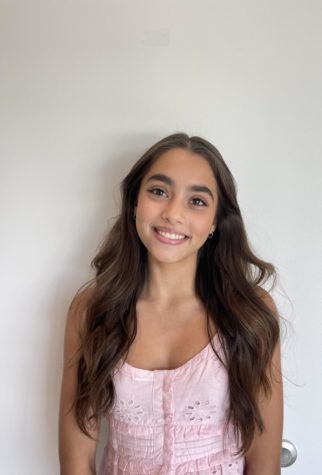Acne Acceptance
Students share experiences with acne, ideas to overcome it
Despite acne’s bothersome nature, it is a normalcy faced by many teenagers. Society, however, often tends to advertise false standards of perfect skin that are unrealistic and hard to achieve.
Sophomore Caroline Doolittle has felt the pressure to have clear skin since the age of 8 when she first started struggling with acne.
“I started getting blackheads on my nose, and it was really obvious that I was already getting acne at such a young age,” Doolittle said. “I just felt really insecure about how I looked and how my face looked compared to other people in my grade. Everyone had a clear face, and I was just that one kid that started so early.”
In an age of comparison, especially among teens, acne is no exception. Junior Emma Schellhase is not the only one who faces this struggle, especially when it comes to the media.
“I think it all goes back to comparing myself to others,” Schellhase said. “[Acne] does make me very self conscious so it’s kind of hard going on social media and seeing people’s perfect skin and comparing myself to that.”
Even with consultation from a dermatologist, it is difficult to find permanent solutions to acne. Senior Alex Johnson believes one of the biggest misconceptions about having acne is, “once it’s gone, it’s gone.”
“It comes back,” he said. “Even when you have a clear face, it’ll come back.”
Doolittle experimented with an assortment of skincare products in search for one that might clear her skin but had little success before consulting a professional.
“The hardest part about it for me would have to be trying all these different ointments I would purchase from Target every single week,” she said. “I would try something new and try and see if it would last and fix my acne. Nothing ended up working from a regular Target or Walmart, so I had to go to the dermatologist.”
After trying several topical ointments but not seeing her desired results, she made the decision to start on an oral prescription called isotretinoin, more commonly known as Accutane. Accutane is usually taken as a last resort due to its severe side effects. Schellhase, in a similar position, also decided to start on Accutane after trial and error with many different pills and creams to clear her skin.
“A month before you start, you have to be on birth control, which has been a big adjustment my body has definitely been getting used to,” Schellhase said. “You [also] have to get your blood drawn quite a bit to make sure your levels are OK. The main symptom I’ve had so far is really dry lips. I cannot leave my house without chapstick — otherwise it’ll be brutal.”
Johnson, though not on Accutane, has taken similar prescriptions of lesser strength to aid his acne. However, Johnson views acne as more of a “small workaround.”
“People don’t notice acne as much as people think they do,” he said. “Around this grade level, you see so many people with it.”
“A lot of girls think it’s unnatural to have acne,” Doolittle added, “but it’s really just part of hormones, going through puberty and growing up.”
Regardless of the severity, anyone can feel insecure about their acne.
“It’s a lot more common for people to be insecure about it,” Schellhase said. “Even with people who only break out like once a month, you’d still be surprised by how insecure they get about it.”
Having acne often teaches the lesson that beauty isn’t skin-deep, and confidence and acceptance comes from within.
“How I make myself feel confident honestly sounds really cringy,” Doolittle said. “I take selfies of myself, and I leave them unedited because when I had acne and I had really bad scarring, I used to take pictures with people or take pictures of myself feeling good and then realize, ‘Oh I have all these bumps on my face, I need to go to this editing app, and I need to totally edit them out.’ Now, I just feel so self confident about myself to where I’m just done with the whole insecurity part.”
Allowing yourself to love and accept yourself for who you are, acne or not, is what allowed many people like Schellhase to feel confident.
“Everyone has something they’re insecure about,” Schellhase said. “Just because beautiful skin isn’t my strength, I have other things that make me beautiful.”

Ayesha Khan is a senior and is Editor-in-Chief. This is her third year on staff. She is also a captain on the Tigerette Dance Team and dances competitively...




